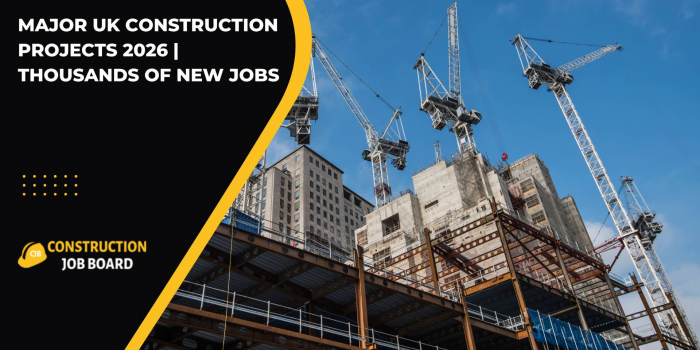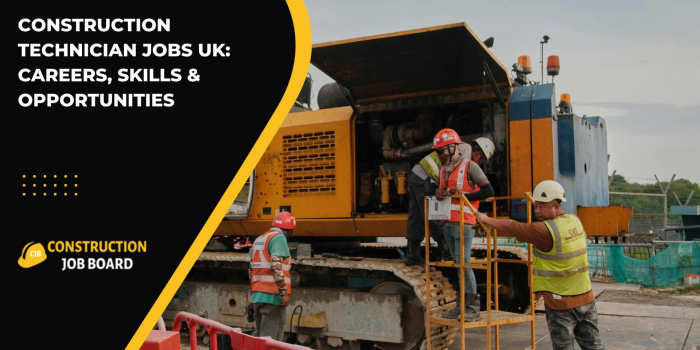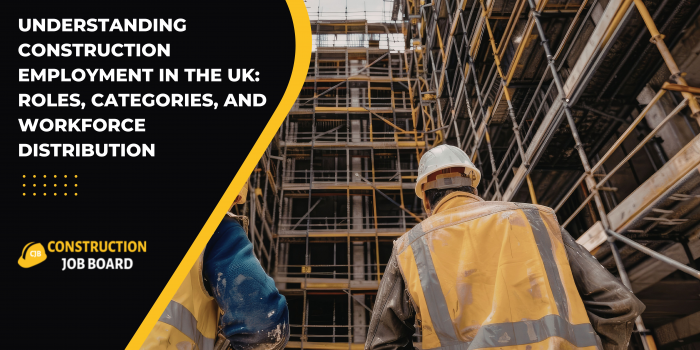Construction Jobs in the UK | Skilled Trades, Civil & Site Management Careers – Construction Job Board UK
07/10/2025

Construction Jobs in the UK Build Your Future in a Growing Industry
The construction industry in the UK is one of the most important engines of the UK economy. Whether it is infrastructure, housing, commercial or industrial builds, construction jobs in the UK provide compelling career opportunities for anyone at all levels.
Whether you are a tradesperson, civil engineer, site manager or planner, there is never a better time to consider a fulfilling career in the construction industry. With thousands of projects taking place in the UK and demand for skilled labour and careers on the rise, the employment situation in the construction industry in the UK is stronger, more stable and more diversified than ever before.
Why Choose a Career in Construction?
Construction is a profession that builds more than physical structures— it builds lives, builds communities, and builds futures. It is one of the few sectors where you can see the results and the impact of your work at the end of the day.
1. Industry Growth and Stability
The UK construction industry continues to thrive as investments from the government pour money into housing, green infrastructure, and renewable energy. Construction employs more than 2.5 million people and contributes billions to the UK national economy.
2. Lots of Different Job Roles
This field includes many different types of work, from hands on jobs inside of the building site to jobs in construction management.
3. Earning Potential
Construction jobs can give you competitive pay with overtime pay and opportunities to advance in the pay sector, and many construction jobs UK are known as some of the highest paying jobs in skilled trades.
4. Skill enhancement
Construction jobs often involve learning on the job, completing an apprenticeship and getting NVQ qualifications -meaning you get skills to last a lifetime and you get to develop your own leadership skills.
Top Construction Job Roles in the UK
The UK's construction sector is made up of a diverse range of disciplines. Below is a selection of the key job types that are sought after in 2025:
1. Site Manager
Site Managers will be responsible for overseeing and coordinating all site activities to ensure that the project runs on time and safely.
Key Skills: Project management, leadership, and health & safety compliance.
2. Construction Worker / Labourer
Construction Workers / Labourers are a fundamental aspect of any building project and will be primarily carrying out manual work, groundwork and material handling.
Key Skills: Physical ability, working well with a team, and handling basic machinery.
3. Civil Engineer
A Civil Engineer's work involves designing and managing infrastructure projects such as bridges, roads and drainage works.
Key Skills: Structural analysis, proficient with AutoCAD and able to coordinate a project.
4. Quantity Surveyor
A Quantity Surveyor will manage the costs of a project and ensure the construction processes are efficient and financially viable.
Key Skills: Budgeting, managing estimates, and some procurement and procurement strategy.
5. Health and Safety Officer
A Health and Safety officer will ensure safety
Major Sectors Offering Construction Jobs in the UK
The construction field is diverse, spanning multiple industries and specialties.
|
Sector |
Typical Job Roles |
|
Residential Construction |
Builders, Site Managers, Electricians |
|
Commercial Construction |
Architects, Project Managers, Planners |
|
Infrastructure & Civil Projects |
Civil Engineers, Surveyors, Technicians |
|
Green Construction |
Sustainability Consultants, Retrofit Specialists |
|
Maintenance & Facilities |
Building Inspectors, Maintenance Engineers |
These industries offer long-term stability, with strong government support for housing, transportation, and sustainability initiatives.
Salary Trends for Construction Jobs in the UK
|
Role |
Average Annual Salary |
|
Construction Labourer |
£25,000 – £35,000 |
|
Site Supervisor |
£35,000 – £50,000 |
|
Civil Engineer |
£40,000 – £60,000 |
|
Quantity Surveyor |
£45,000 – £65,000 |
|
Project Manager |
£55,000 – £85,000 |
Salaries vary by experience, region, and project scale. London, Manchester, and Birmingham currently offer the highest pay rates for construction worker jobs and construction management jobs.
Skills Required for a Successful Construction Career
To succeed in the UK construction industry, professionals need both technical expertise and interpersonal skills.
Technical Skills:
- Site supervision and planning
- Blueprint reading
- Structural design and AutoCAD
- Knowledge of construction regulations and safety standards
Soft Skills:
- Communication and leadership
- Time management
- Problem-solving under pressure
- Team collaboration
Recommended Certifications:
- CSCS Card (Construction Skills Certification Scheme)
- NEBOSH Health & Safety Certification
- NVQ Diploma in Construction Management
- SMSTS (Site Management Safety Training Scheme)
The Future of Construction Jobs in the UK
The construction sector is changing rapidly with technology and sustainable practices at its forefront. Emerging practies such as modular construction, green building and digital site management are being adopted to change how projects are delivered.
1. Green Construction
There's a substantial transition towards sustainable materials and energy efficient designs along with carbon neutral buildings.
2. Digital Transformation
New digital technologies such as BIM (Building Information Modelling), drones and AI are improving project accuracy and eliminating waste.
3. Smart Infrastructure
Public projects are embracing sensors and IoT for real-time analysis, requiring the construction workforce to embrace these technologies and processes.
The future of construction occupations resides in sustainability, innovation, and flexibility.
How to Find the Best Construction Jobs in the UK
1. Utilise Specialist Job Engines
General job board sites can be overwhelming. Visit Construction Job Board UK for dedicated listings of validated construction jobs UK (UK Contractors, Apprenticeships, Senior Management).
2. Network in the Industry
Get involved with professional bodies, like the CIOB (Chartered Institute of Building), and go to trade shows or job fairs.
3. Keep Skills Current
Stay ahead of the curve by getting health & safety refreshers and sustainability courses, or on leaders courses and so on.
4. Tailor your CV
Top employers are always looking for site experience, project experience, and be sure to show off your certifications.
Why Construction Job Board UK is Your Best Choice
Construction Job Board UK is the UK’s trusted service connecting talented individuals with reputable companies.
You can:
- Search for building site jobs and civil engineering jobs all over the UK.
- Apply directly to employers that need qualified individuals.
- Receive real-time alerts of jobs based on fields of work and location.
- Construction Job Board UK simplifies and streamlines the job search process for those looking for new opportunities, whether you are entering the job market or wanting to take the next step.
Conclusion – Start Building Your Future Today
The UK construction industry offers endless opportunities to grow, learn, and make an impact. With new projects emerging daily and strong government investment, it’s the perfect time to advance your construction career.
Visit Construction Job Board UK today to explore hundreds of live construction jobs in the UK from trades and engineering to project management.
FAQs About Construction Jobs in the UK
1. What qualifications do I need for construction jobs in the UK?
Basic site roles may require a CSCS card, while advanced positions may need NVQs, degrees in construction management, or engineering qualifications.
2. Are construction jobs in demand in the UK?
Yes. The construction industry is expanding rapidly, especially in housing, infrastructure, and green building projects.
3. How much can I earn in construction jobs UK?
Salaries range from £25,000 for entry-level labourers to over £80,000 for project managers or engineers.
4. What cities offer the most construction job opportunities?
London, Manchester, Birmingham, Leeds, and Glasgow have the highest number of construction openings.
5. Can I work in construction without prior experience?
Yes. Many entry-level roles provide on-the-job training and apprenticeships, allowing you to gain experience while earning.







































































































































































